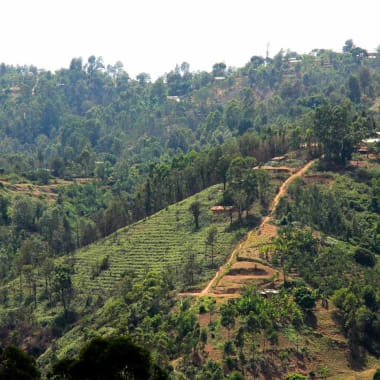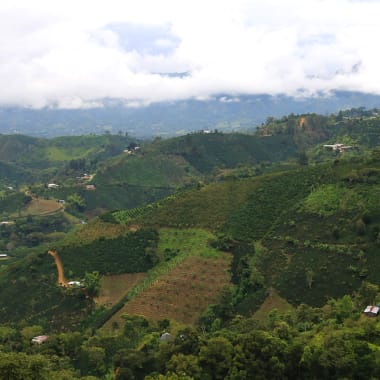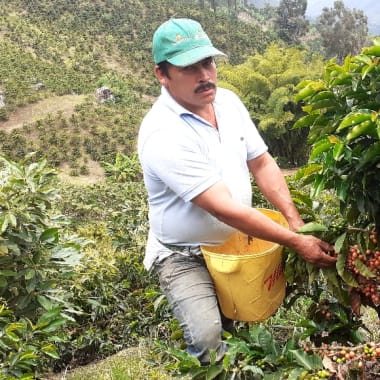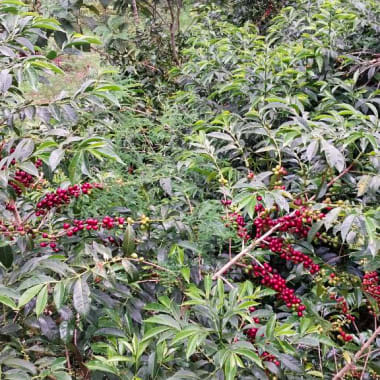-
Producer
-
Sehe Washing Station
-
Country
- Burundi
-
Region
-
Cibitoke
-
Altitude
-
1700m above sea level
-
Varietals
-
Process
-
Harvested
-
July 2018
-
Body
-
Light
-
Acidity
-
Medium
-
Tasting notes
-
Lollypop, strawberry, orange
-
Roast style
Burundi
Sehe
Cherries are grown and gathered in the high hills of the Sehe. There are around 1,500 coffee farmers collecting ripe cherry from the Sehe region to be processed at various collection points.
Salum Ramadhan founded Coffee Processing Company in 2010 with the goal of improving the quality of life for the very smallholder producers in the Kayanza and Cibitoke provinces. CPC operates four washing stations, including Sehe and Shembati (which we’re shared previously).
He offers a premium price for farmers in exchange for high quality coffee and for delivering only ripe cherries to his washing stations. He’s also investing in social and environmental projects such as education in the local areas, ponds for waste water etc.
Competition in the area can be fierce but by keeping his prices consistently high, farmers are financially encouraged to select only premium and ripe cherry. Cherries are sorted by hand and through floatation, and only ripe cherries are transported down the mountains to the washing station.
Salum Ramadhan’s washing stations have a solid reputation for producing exceptionally clean and top quality coffee.
Salum sees a lot of value in supporting the local communities. He also has an environmental focus with a recycled water program and operates a small local transport business to assist with various collection points across the country. He’s creating employment, has built infrastructure for the locals, giving out seedlings, has donated land for a school as well as supported it financially.
This, together with the premiums and second payments for the coffees, is to encourage the farmers to increase the quality in their farms and pick better cherries during harvest. And that will again be beneficial to all of us.
Honey process at Sehe
At Sehe they select the highest quality cherries for their honey process as it’s a relatively complicated process in their climate, particularly early in the harvest season when there’s a lot of rain.
The cherries are separated by soaking and are hand sorted before going to production – after this they’re de-pulped before being graded to three grades by density where only the first grades from the denser beans goes to Honey production. After pulping and grading they still have all the mucilage left, which would be referred to as black honey in other regions such as Costa Rica.
They are then dried under shade in a medium thick layer for the first 1-2 days. They’re then moved out in the sun, and covered again at night.
After the first few days they start to lose the ‘sticky’ parchment layer and the cherries are raked so they don’t stick to each other. After around 20 days drying in the sun on raised beds, they’re ready for sorting for defects and transport.
Sourcing and ingredients
100% Red Bourbon, Jackson coffee beans, provided by Langdon Coffee Merchants and roasted by us on Gadigal land / Sydney.
Country grade: Unknown ?
Packaging
Bag: ABA Certified home compostable
Label: Recyclable
Valve (on bags larger than 250g): General waste
Coffee ordered online is shipped in a recyclable cardboard box
Brewing this coffee
We recommend brewing this coffee 15–49 days post-roast. If pre-ground, brew as soon as possible. Our advice on storing coffee.
1:3
dose:yield
ratio
To brew on espresso, we recommend using 20g of beans (dose) to get 60g of espresso out (yield), during 24-28 seconds.
1:16.7
beans:water
ratio
To brew in infusion/fed brewers (V60, Chemex) use a ratio of 1:16.7 ratio of beans:water.
1:14.3
beans:water
ratio
To brew in immersion brewers (plunger, AeroPress, Kalita, batch brewer) we recommend using a 1:14.3 ratio of beans:water
1:12
beans:water
ratio
To brew as cold brew we recommend using a 1:12 ratio of beans:water
Varietals
Jackson varietal
The varieties known as Jackson, Kent, Coorg, and Mysore—all originating from the same region in India—are most likely late descendant of the first coffee seeds out of Yemen brought to India by Baba Budan in 1670. Recent genetic tests have confirmed that Jackson is related to the Bourbon genetic group.
Red Bourbon varietal
The location
Coffee from Burundi
Coffee first arrived in Burundi in the 1920s while the country was still under Belgian colonial rule. Since the civil war in 1993 Burundi has placed a great importance on growing the coffee industry and the flow on effects that will have on the country’s economy.
Farm processes
Honey process
This technique leaves some flesh on the coffee cherry as it is washed and dried. This tends to give a slightly sweeter flavour, but can also reduce the quality and longevity of the coffee due to the fermentation of the sugars in the flesh.

Subscribe to a world of coffee
Discover a new single origin coffee from Sample every 1-5 weeks with no delivery fees.
No up-front purchase, and you can pause, cancel, or change plans at any time.
Available to order online this week:

Kenya Gathaithi
Flavours of burnt toffee, orange, cola
Body Acidity
Washed SL-28, SL-34, Ruiru 11, Batian
November 2023 harvest
Roasted omni for filter and espresso
Kenya Gathaithi online
Colombia La Serrania Decaf
Flavours of honey and blackberry
Body Acidity
Washed + EA Natural Decaf Caturra, Castillo, V.Colombia
Roasted omni for filter and espresso
Colombia La Serrania Decaf online
Colombia Faver Emir Ninco
Flavours of cola, cherry, blood orange
Body Acidity
Washed Pink Bourbon
March 2024 harvest
Roasted omni for filter and espresso
Colombia Faver Emir Ninco online
Ethiopia Bekele Gemeda
Flavours of orange marmalade, peach, apricot
Body Acidity
Washed Ethiopian Heirloom
January 2024 harvest
Roasted omni for filter and espresso
Ethiopia Bekele Gemeda online